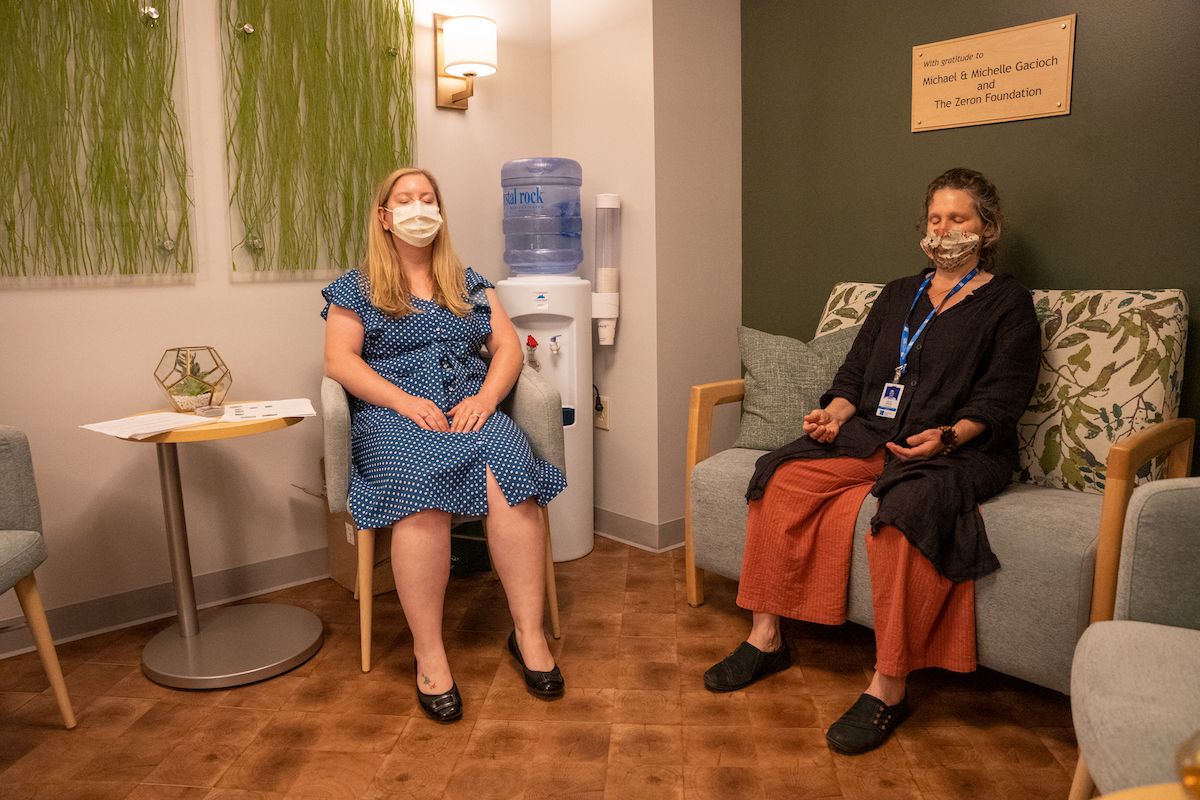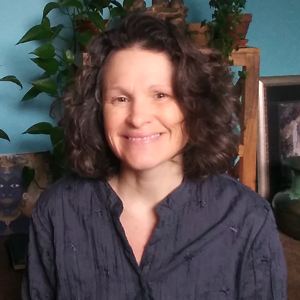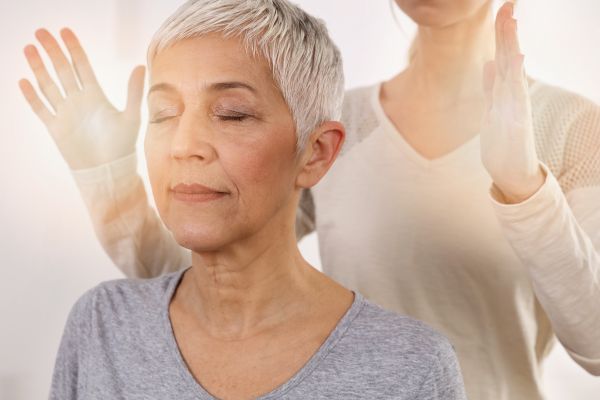These techniques can help manage the kind of stress that is common during cancer treatment and caregiving
When’s the last time you stopped to think about the simple, yet essential, act of breathing?
Even if you haven’t given any thought to your breath over the past few hours, days, weeks or even years, your breath has always been there for you, and your breath will always be accessible to you as both a vital physical component of your health and – perhaps – an untapped tool for mind-body well-being.
Julia Kress, BS, E-RYT 500, AYS, is a trauma-informed adaptive yoga therapist and meditation instructor who has been teaching health and wellness for nearly 40 years. Thanks to generous funding through Roswell Park Alliance Foundation’s Quality of Life Program, she facilitates walk-in Breathwork and Relaxation sessions with patients, caregivers and employees every Wednesday from 12 - 2 p.m. in The 11 Day Power Play Cancer Resource Center. The sessions are offered through Roswell Park’s Wellness Program.
Sessions are usually 1:1 or 1:2 and last about 5 to 10 minutes. "When I first sit down with someone in a Breathwork and Relaxation session, I invite them to see and feel that their ordinary experience is one that they can find grounding in,” explains Kress. “A sense of grounding is created when you become aware of the physical reality, that you're sitting in a chair and that there’s a room around you. Then, when you close your eyes, you can gain access to sensations in your body that you may usually overlook. For example, you may feel a slight tingling in your fingertips, or you may notice the coolness of the air around you.”
After experiencing a grounded feeling, Kress encourages participants to bring awareness to their breath. “When we notice our breath, we build up a quality of respect for both the anatomy of breathing and the connection between the mind and body,” says Kress. “From there, the next step is in knowing that our thoughts can be regulated by our breath. The quality of our breath, whether fast or slow, deep or shallow, directly affects the quality of our thoughts, words and actions. For instance, when we slow our breathing down, we may notice fewer anxious thoughts.”
Breathing is the keystone to mind-body practice
During practice, participants may learn that they’re preoccupied in their minds, or preoccupied with pain or other ill effects of cancer treatment. “It’s a relaxation process that’s accomplished by giving us space to see where we can press the pause button, so to speak. In this space we can see that we can let go of habits that aren’t serving us so we can move toward building the skills necessary for habits that allow for openness, inquiry, wisdom and gratitude,” she says.
Breathwork techniques can help manage the kind of stress that is common during cancer treatment and caregiving, such as anxiety or low mood, difficulty falling asleep, poor concentration, avoidance of anything that will trigger difficult memories, or feeling emotionally numb or detached from people. Breathwork is calming and restorative. It lowers breathing and heart rate, decreasing blood pressure, and increase blood flow to the intestines and reproductive organs. Furthermore, studies have shown that breathwork after treatment can greatly improve symptoms such as pain and fatigue.
Accessing awareness of choice
Breathwork and Relaxation sessions provide patients and caregivers with a helpful tool for further understanding themselves in the context of cancer or caregiving. “Cancer may be a part of our reality, but it’s not our whole reality,” says Kress. “At the heart of awareness-based practice is the awareness of choice. No matter what we’re facing, we always have a choice as to where we put our attention. What I find so beautiful and rewarding working with cancer patients and caregivers is that they can so often find gratitude for where they are. ‘I can’t help but feel grateful,’ one patient shared with me.”
“The mind can be the hardest thing to work with, but I love this work because it’s accessible to everyone, it’s simple and it’s repeatable. And, at its core, our humanity comes forward. There’s a relationship that’s built so patients and caregivers leave feeling not so alone. They feel more welcomed to be themselves and they feel more encouraged to let go of some of their fears and uncertainty.”
A coping tool for treatment side effects
Bill O’Shei is a multiple myeloma survivor who can attest to the positive benefits of breathwork. As Bill describes, you don’t have to be in a special place to access the power of your breath for relaxation. “I often use the breathwork techniques that I learned from Julia when I'm in clinic, if I'm in a procedure or if I'm going in for an MRI,” shares Bill. “It’s almost second nature to me now when I begin feeling a lot of stress. I can decrease my heart rate just by clearing my mind.”
In addition to lowering his heart rate, Bill has noticed that practicing breathwork techniques has helped him cope with stomach issues, neuropathy, depression and anxiety. “After using breathwork techniques I feel mentally refreshed,” shares Bill. “What I've learned from Julia helps me feel mentally stronger. I think part of the reason I've done well with my treatment is people like Julia in my life.”
Come visit us!
The 11 Day Power Play Cancer Resource Center offers programming and resources to support patients and caregivers. Located on the first floor of the main hospital near the Tower Elevators, the Resource Center is open Monday through Friday from 9 a.m.- 4 p.m. Questions? Call the Resource Center at 716-845-8659 (option 1) or email ResourceCenter@RoswellPark.org.
Learn more Resource Center events calendarProgramming in the Resource Center is generously funded by donor dollars as part of the Quality-of-Life Program.




